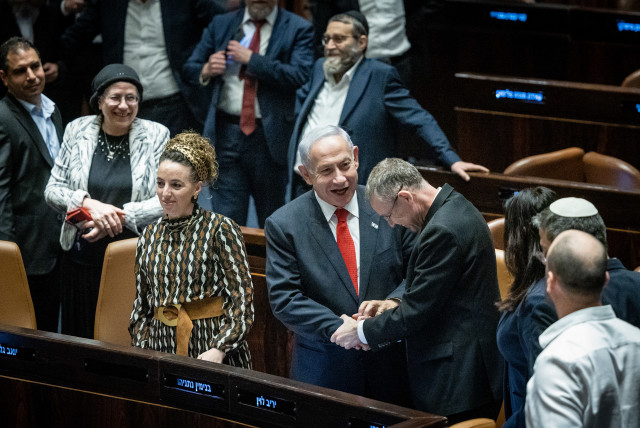Is Israel's new judicial reform law leverage for Netanyahu? - analysis

The prime minister sends a message that the coalition doesn't need the opposition to negotiate to advance its judicial agenda.
The passing of the reasonableness standard law last Monday may have been a success for the pro-judicial reform camp, but the legislation may have also been aimed at creating a stronger negotiation position for the coalition.
The judicial reform was put on pause at the end of March by Prime Minister Benjamin Netanyahu in response to unprecedented country-wide protests. The Judicial Selection Committee bill was frozen in place before its second and third readings, while the coalition and opposition met at the President's Residence to negotiate a broad agreement on a reform outline.
Netanyahu faced two immediate problems: A base and coalition partners urging him to fulfill his political promises, and an opposition that felt that it had a strong negotiation hand.
Judicial reform negotiations - the story so far
The talks had started on the terms of the opposition - the cessation of legislation. The coalition had said that they would talk with their opponents, but the opposition had refused to do so without their preconditions being met.
Talks imploded in June when Justice Minister Yariv Levin refused to convene the Judicial Selection Committee until it had been reformed. The Judicial Selection Committee has been a central issue in judicial reform, as it administers the appointments and promotions of judges. This became even more immediately sensitive when an anti-reform faction won the June 20 elections for the Israel Bar Association, which selects two representatives for the panel.
The opposition walked away from the table unless the committee was to be assembled, a negotiation strategy that expresses confidence and a strong hand.
Soon after, the coalition began the legislative process of the reasonableness standard bill, which would restrict the application of judicial review against ministerial administrative decisions. While a component of the reform, it has never been touted as the most important. Arguably the most important provision of the reform, the Judicial Selection Committee bill remained frozen while the coalition went through the pains of developing a new draft law.
The reason for this has been unclear - Knesset Constitution, Law and Justice Committee chairman and Religious Zionist MK Simcha Rothman said in late June that the bill wasn't being advanced in response to the opposition, but because he believed it should always have been advanced.
Yet in his interview with Good Morning America on ABC News on Friday, Netanyahu said that he had attempted to negotiate for three months, leading to the bill
"I couldn't get anything from the opposition, and therefore decided to proceed with this minor correction," said Netanyahu
Rothman said in June that Reasonableness was chosen to promote because it was the most agreed-upon issue. This didn't calm protesters.
Aliyah and Integration Minister Ofir Sofer offered a different explanation on July 28 when he spoke to KAN Reshet Bet.
The government advanced the reasonableness standard law because they "felt a need to do something small," said Sofer.
Netanyahu has also described the law as a "minor correction" with GMA.
Netanyahu wants the strong hand
"Something small" may have served to satisfy Netanyahu's base and his coalition members, and create a feeling of victory.
Yet, it may have been more for the consumption of the opposition, showing them that in the next round of negotiation, the coalition is the side with the strong hand.
"When they see that we have the majority to legislate without them, maybe we'll be able to legislate with them," Netanyahu told CNN on Friday.
The prime minister told GMA that he was "actually more optimistic than I was before, because up until now, now they can see that we're prepared to move without them, we have the majority, maybe we'll be able to move with them."
Netanyahu even warned that if the opposition wasn't willing to negotiate with him, he would "try to proceed if not with a consensus with the opposition than with the public."
Showing that the coalition doesn't need to negotiate to advance its agenda shows the opposition that their position isn't as strong, and they will need to moderate their demands to reach an agreement - resulting in deals more favorable to the coalition.
Netanyahu has repeatedly promoted the idea of negotiations in Israel and abroad since the passing of the reasonableness law, but the opposition and protest factions seem skeptical of the sincerity of the proposal.
It is difficult to know if the reasonableness law was intended as a negotiation tactic or if was an unplanned side effect, but it could bring the Likud a more secure seat at the President's Residence table.
Jerusalem Post Store
`; document.getElementById("linkPremium").innerHTML = cont; var divWithLink = document.getElementById("premium-link"); if (divWithLink !== null && divWithLink !== 'undefined') { divWithLink.style.border = "solid 1px #cb0f3e"; divWithLink.style.textAlign = "center"; divWithLink.style.marginBottom = "15px"; divWithLink.style.marginTop = "15px"; divWithLink.style.width = "100%"; divWithLink.style.backgroundColor = "#122952"; divWithLink.style.color = "#ffffff"; divWithLink.style.lineHeight = "1.5"; } } (function (v, i) { });


